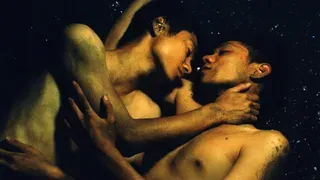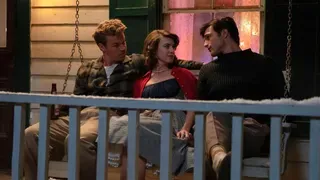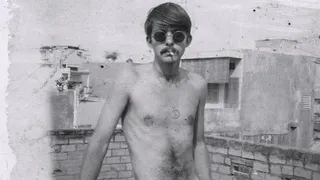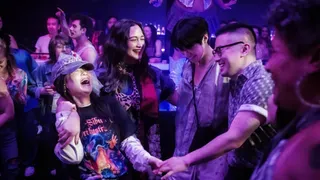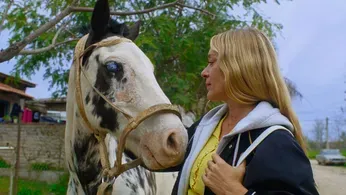
Apr 25
Review: This 'Magic Farm' Cultivates Slow-Burning Queer Love, but Yields a Disappointing Harvest
C.J. Prince READ TIME: 3 MIN.
After her feature debut "El Planeta," artist and filmmaker Amalia Ulman returns with her sophomore effort, "Magic Farm," a more ambitious production that still takes inspiration from the personal and political.
Ulman's debut, a low budget, black and white comedy with Ulman starring alongside her own mother, addressed themes involving class relations as it followed a mother and daughter scamming their way into money in the region of Spain where Ulman grew up. "Magic Farm," shot in saturated color with a far more eccentric style, takes place in the area of Argentina where Ulman was born. She satirizes new media through the culture clash between locals suffering from a health crisis and a bumbling American production crew from a Vice-esque enterprise trying to find a story worth filming. But Ulman's late attempts to take down the culture vulture journalism boom from last decade amount to very little, and her scattered, unfocused approach to her film's single idea ends up aligning her with the inept crew at the center of her film.
It's fitting, then, that Ulman casts herself as one of the crew members. An opening scene set in New York introduces us to Edna (Chloë Sevigny), the host of a show that highlights "strange" subcultures around the world like people wearing pointy boots in Mexico, a joke that says everything about the kind of news they want to cover. An arbitrary time jump sees Edna arrive in a small Argentinian village with her partner Dave (Simon Rex), cameraperson Elena (Ulman), producer Jeff (Alex Wolff), and sound guy Justin (Joe Apollonio). They show up to profile a local musician known for their strange music videos, but things almost immediately fly off the rails: Dave rushes back to America to deal with women making accusations against him (something everyone but Edna is aware of), and Jeff realizes the musician resides in a village with the same name but in an entirely different country.
Once Ulman establishes and re-establishes the incompetent nature of her central characters, "Magic Farm" spins its wheels as the team spends their days interacting with the locals while Edna mostly keeps to herself. Jeff, who oscillates between whiny and horny the whole time, picks up on the attraction a young woman (Camila Del Campo) has for him; Elena interviews townspeople while dealing with a personal crisis as well as Dave's; and Justin develops an attraction to the hotel owner (Guillermo Jacubowicz), an older man and single father who might like Justin back.
In interviews for the film, Ulman said that she encouraged improvisation while filming "Magic Farm," and it shows in the aimlessness of most scenes. Colorful visuals, unconventional camera setups (usually on the heads of dogs and horses), a fun Cumbia score, and some neat scene transitions keep things visually interesting, even if they're little more than quirks.
The rest of "Magic Farm" heads towards its inevitable conclusion, one that underlines the ensemble's selfish traits already shown through broad strokes in the first act. With no story to film, the crew opts to make one up, although Ulman sidelines that process for underbaked characterizations and interactions. The subplot between Justin and the hotel owner, which has potential through Apollonio and Jacubowicz's endearing performances, gets undercut by Ulman's need to establish Justin's attraction to older men and daddy issues through pointed lines of dialogue. It's an unnecessary contextualization for the characters' sincere, but fleeting, connection.
And the town's health crisis in the film's periphery, the result of corporations spraying toxic chemicals on the land, boils down to pointing out the group's inability to see something actually newsworthy (Ulman said that this is more about miscommunication, with the overly polite local culture making them too modest to talk about the poisoning, but this barely registers).
Ulman has a fine starting point in wanting to explore this specific, awkward dynamic between locals and exploitative tourists, but "Magic Farm" flounders in its efforts to find something resonant.
"Magic Farm" opens in limited release April 25 and expands to a wider release May 2.



